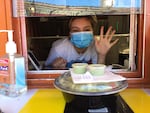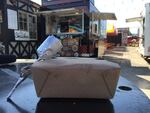When Portland’s Le Bistro Montage permanently closed its doors in June due to the COVID-19 pandemic, fans of its Southern-inspired comfort food were devastated.
One Yelp reviewer asked, “Oh Montage, what will Portland do without you?”
It didn’t take long before former executive chef Derek Ingwood figured out a way to sling the mac-n-cheese and jambalaya again.

Derek Ingwood opened the Montage Ala Cart food cart in August 2020.
Geoff Norcross / OPB
Montage Ala Cart opened as a food cart this month, with Ingwood as its owner. He licensed the Montage name from the owners and grabbed the last open spot in the Hawthorne Asylum food cart pod.
“I think it’s the only move right now for any restaurant that’s trying to survive,” Ingwood said. “If you’re going to go out of business because of this whole pandemic thing, this might be your only option rather than throwing in the towel.”
Ingwood had to pare down his menu to the top dozen or so most popular dishes. Also gone are the famous aluminum foil creatures the restaurant wrapped its po’ boys in. Not enough room for that in the cart.
“It’s a lot different than just running the day-to-day in a kitchen,” Ingwood said.
Born during hardship
Industry observers say food cart operators by their very nature have to be nimble.
The big Portland food cart boom came more than a decade ago during the Great Recession, when the key to survival for food purveyors was to sell something fast and cheap that Portlanders could take back to their offices.
Now, with sit-down dining severely limited, take-out options are king again.
“I do think that we’re uniquely positioned to make it through a downturn like this and in the strange environment we’re in, because we are designed for takeout,” said Leah Tucker, founder of the Oregon Mobile Food Association.
“That’s the basis of who we are.”
It appears to be working. Portland’s food carts are hanging on during the pandemic in a way that restaurants aren’t. Multnomah County said the number of applications for mobile food unit permits is about the same as this time last year. By contrast, the number of permit applications for restaurants is 50% less.
Jeff Martin, an environmental health supervisor for the Multnomah County Health Department, said food carts have been pretty much able to operate uninterrupted during the pandemic.
“Some of them had some of their busiest days ever during this pandemic because there’s such a limit now on the amount of food available to the public,” Martin said. “Food carts are now filling that niche.”
Easier to follow the rules
On a recent Monday in the Hillsdale food cart pod, the lunch time crowd consisted of a smattering of customers sitting far apart at picnic tables that used to be more tightly packed. They all wore masks when they ordered, and their order takers talked to them from behind a pane of glass.
Rachel Maneloveg of Tigard, who was there enjoying a chicken bowl from Taco City, said it’s no big deal.
“It’s still a little weird having to wear a mask and talk to somebody behind a glass. But I think it’s important to support people during these times,” Maneloveg said.
Restaurant patrons have to abide by a longer list of rules. In addition to the mask and distance requirements, there can’t be more than 100 diners in any restaurant in Oregon at a time.
Elaine Escobar is a cook at Taco City. Because she has family members that are at higher risk of contracting COVID-19, she was afraid at first to come back to work. But she said her customers have been so nice and so compliant with the rules, she’s glad to be back on the job.

Elaine Escobar works at the Taco City food truck in the Hillsdale food cart pod in Portland, Ore.
Geoff Norcross / OPB
Escobar said, “It was pretty scary at first. But also everybody is doing a good job with wearing their own masks.”
Easier, but not easy
While food cart owners don’t have the same regulations to navigate that restaurants do, there are unique challenges. Due to a lack of storage space, food cart operators have to supply themselves day-by-day. That leaves them especially vulnerable to COVID-related supply chain disruptions. Also, the coronavirus hit in the winter, when most food cart owners are just starting to ramp into their high-earning months.

The famous foil art from Le Bistro Montage is gone, but the new food cart gives foil roses with every order.
Geoff Norcross / OPB
But owners who were able to hang on and serve food in the spring and summer have been able to preserve a slice of Portland’s vaunted food culture in a time of massive upheaval.
Derek Ingwood of Montage Ala Cart said, “People are able to come out here and kind of forget all about that for once. They’re able to come out here and enjoy this little slice of Portland they thought was going to disappear forever.”
“They’re able to get a glimmer of positivity in this massive wave of negativity.”
